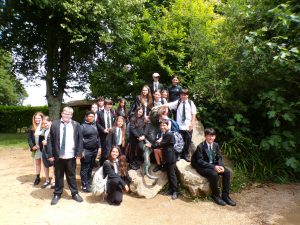Eco Assembly on Climate Change
On the day of the assembly, the Eco Team greeted us as we entered the Theatre and showed posters on protest boards about how to challenge climate change.
They also played the music ‘Be the Rain’ to help us understand the message and how we need to take action on climate change.
They held up many emotive banners with effective images of animals affected by climate change and pollution. The purpose was to show what it would be like at a climate change protest. We learned about all the strategies we can use in everyday lives to combat climate change, from cutting down trees to having a meat free day.
Then, they silenced the Theatre with all the Eco Team making a speech on how we should battle climate change and how we are the only factor that is stopping it entirely and how we can do something to slow it down.
They all spoke very well, and we learned many facts about this subject.
The Team has also taught us the meaning of climate and weather and how different they are to identify.
The earth is like a greenhouse. The earth’s advanced greenhouse effect is full of methane, water vapor and carbon dioxide. These gases trap heat in the atmosphere, leading to a warming effect on the planet. Human activities, such as burning fossil fuels and industrial processes, are the primary drivers of increased concentrations of these gases in the atmosphere.
The assembly talked about climate change and how to beat it.
You may or may not have noticed in St Helier, near Victoria Avenue, there are coloured stripes along the wall. There is blue and red, red means it was hotter than the other year or blue which means that it has been colder since last year.
Climate change describes a change in the typical weather for a region – such as high and low temperatures and amount of rainfall – over a long period of time.
How to save the planet:
- Be healthy.
- Walk to school to avoid using transport.
- Reduce, reuse, repair and recycle.
- Buy more second hand items rather than adding to landfill.
- More vegetables and fruits to be eaten rather than meat that produces harmful gases.
- Throw away less food, only buy what you need.
- Use reusable items and avoid using plastic.
- Do not throw your plastic on the floor.
- Reuse: to use something that has been used as something else.
- Reduce: avoid using non-biodegradable materials such as plastic.
- Recycle: making something out of something used.
- Make your money count, do not waste food.
- Buy Fairtrade produce which is ethically sourced.
Derek






